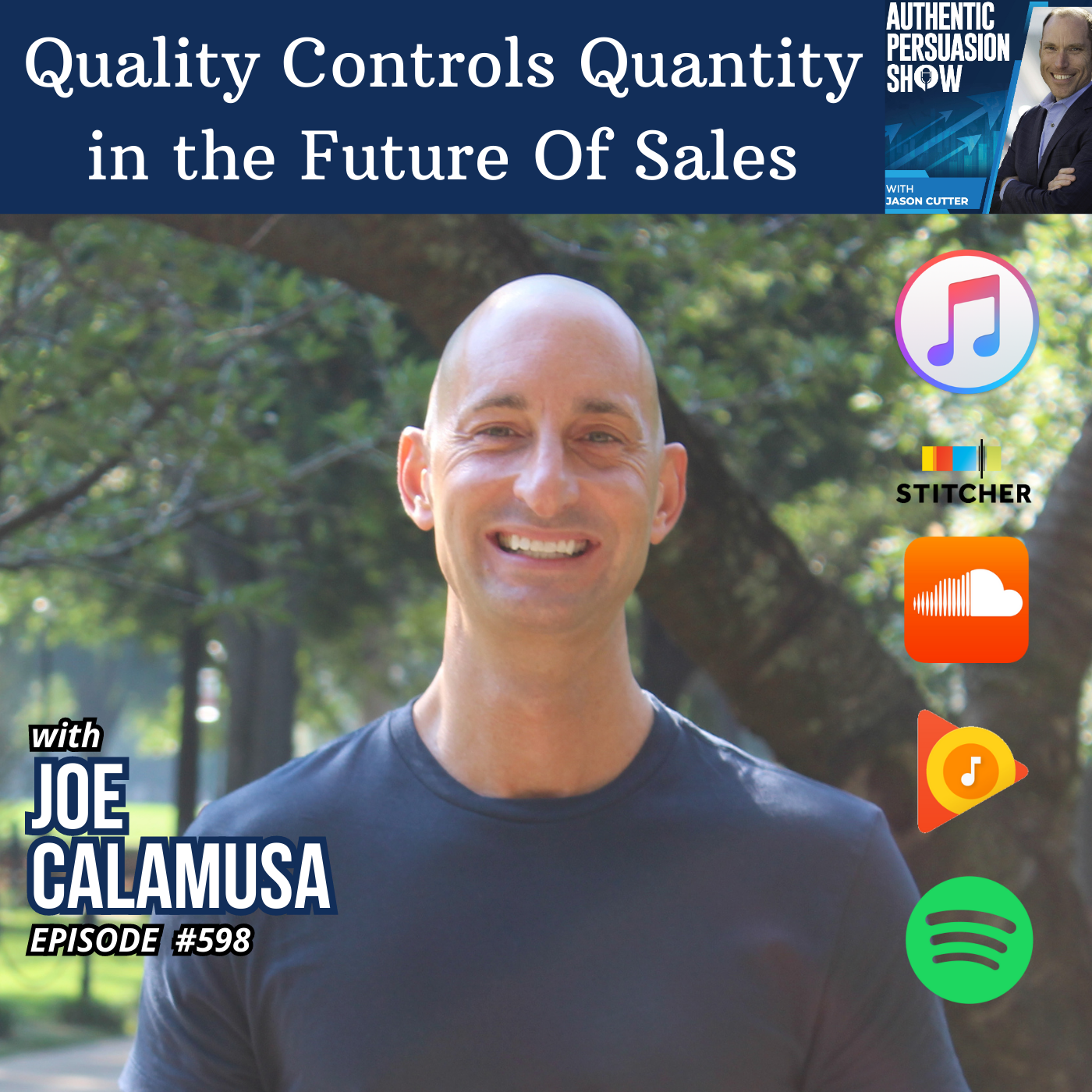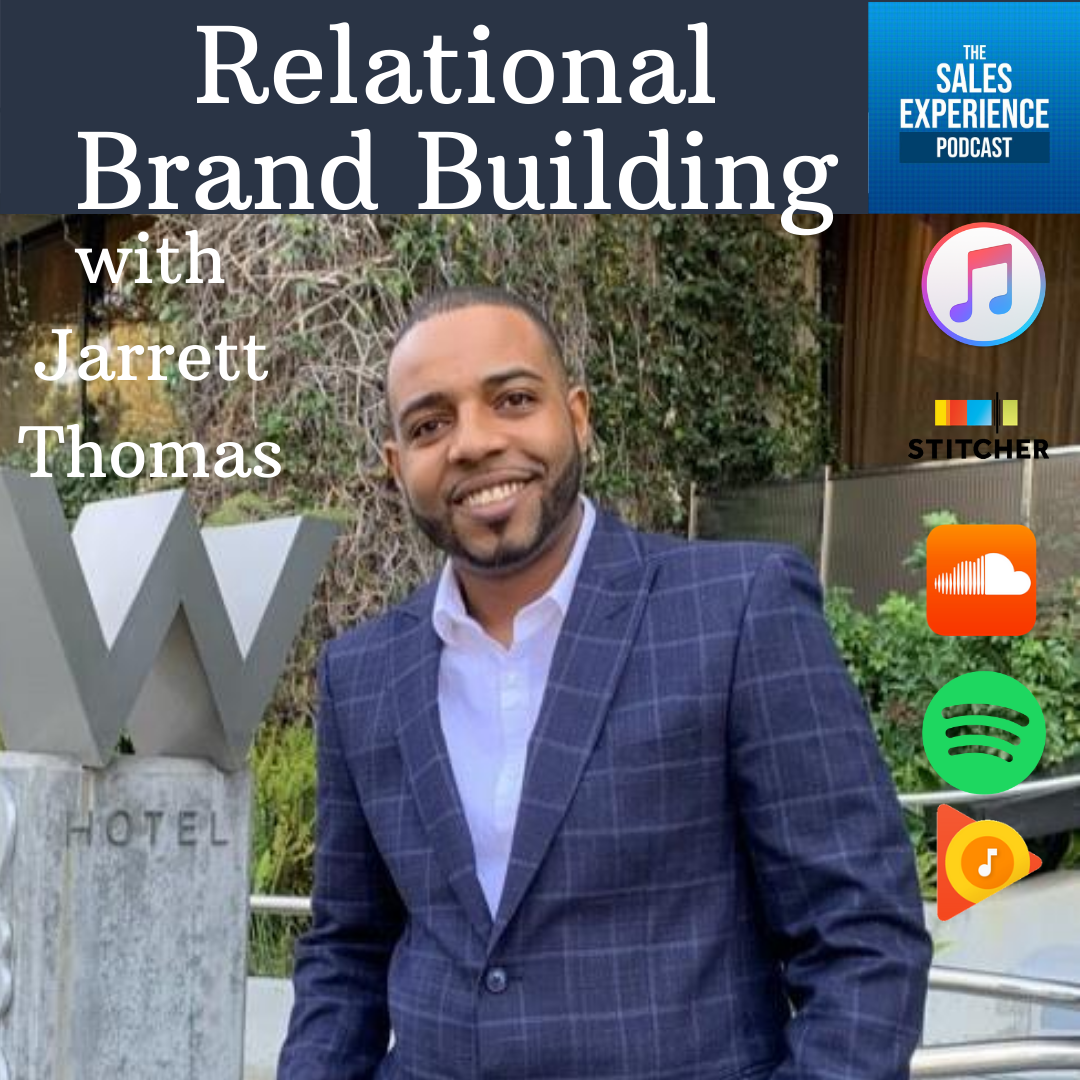Show Notes
Part 2 of the CRM busting conversation with Adam Honig, from Spiro.ai.
Love CRMs? Hate CRMs? We talk about why…for both groups.
Download The Power of Authentic Persuasion ebook
Enroll in the Authentic Persuasion Online Course
Get help with your sales team
Connect with Jason on LinkedIn
Connect with Adam on Linkedin
Adam’s Bio:
Adam is passionate about helping companies make more money using artificial intelligence, and is the driving force behind Spiro’s pioneering new approach: proactive relationship management. As CEO, he is focused on the company’s overall market strategy and vision.
Previously, Adam co-founded a software company which he led through its successful IPO and sale. Afterwards, he founded Innoveer, one of the largest CRM consulting firms, which was successfully acquired by Cloud Sherpas (and then Accenture).
Where to follow Adam:
https://www.linkedin.com/in/adamhonig/
Links:
https://spiro.ai/resources/guide/infographic-not-your-fathers-crm/
https://spiro.ai/resources/guide/proactive-relationship-management/
E213 – Transcript
Jason: Welcome back, part two, my conversation with Adam Honig from Spiro.ai. We’re going to continue this conversation talking about CRMs, not talking about CRM, sales reps, all of those things. Here you go, here’s the episode. I’ll see you at the end. If it’s a long sale cycle, you need more relational people, it’s going to be more analytics, there’s going to be a lot more that you have to know. If it’s short, then it’s about, you know, being able to use persuasion, get in there, you don’t want to overburden somebody and then make the sale happen and then move on.
Adam: Right, right. Yeah, no, that’s a really good way of thinking about it as well.
Jason: So let’s talk about CRMs then since that’s kind of the point and the focus of this in your experience, because you’ve done the CRM game for a really long time and obviously there’s your technology, which we’ll talk about when that comes up. In your experience, any way to get like sales reps to do the right behavior, to reinforce the right behavior, encourage the right behavior for anyone listening to this who has a CRM or they’re on spreadsheets and they’re like, what can I do?
Adam: I don’t think so. I think the time is, listen, the first, so I was a partner at Siebel Systems in the 90s with the first true CRM that came out, and I worked with every CRM since, I’ll just give you one example. In my last company, we worked with a company called Covidien, which is a medical equipment maker, a $3 billion company. They had spent $3 million to implement salesforce.com with a sensor and like six months later, 10% of their sales team was using it. So the answer at the time was for them to pay me a half a million dollars to do some rework to the system and try to change it. So the sales people were going to use it and stuff like that.
Adam: And yeah, I mean we made some changes that, you know, usage went up to 30% they were super happy, but it’s a terrible thing. No, I think there’s just systematic issues as to why 20 years later after CRM was invented, we’re still saying how do we get salespeople to use it. And what happened for me was I just had this moment in the movies. Of course as these things happen that I realized, you know, that we should not continue trying to solve this problem. It’s like you can only fix the house so much. At some point you have to be like, listen, we need a new foundation. Okay, you’re going to lose the kitchen. It doesn’t matter. Like let’s just tear the thing down and build something that actually works for sales people instead of, you know, asking them to change the way that they’re doing. Cause I don’t think they’re ever going to do that. That’s just one man’s point of view here.
Jason: Yeah. And at the top because I almost thought you were going to give some actual tips, but it makes sense kind of with what your experience has been and where you’re going with this. And you know what you guys do at Spiro
Adam: And I tell you that the classic change management things to get people to adopt CRM. So you make people live in the system, you run all of your meetings with the system pulled up to you know, name and shame them. If they’re not putting data in, you put incentives in place to encourage the right behavior. You have negative things that happen if people don’t follow the rules and four weeks later all of that goes out the window because you’re chasing this deal. And it’s much more important than doing any of these, you know, things, I just charge you half a million dollars for it. That’s the problem with all of it.
Jason: Yeah. And it’s tough cause I really agree based on my experience, which definitely hasn’t been as long as yours. But in all the organizations I’ve seen where people aren’t using it, the only time where it really does work well where a CRM but it’s beyond a CRM because it’s actually more order management and sales management is when all orders or things have to go through that CRM in order to be a consummated, right. For the sales rep to move a purchase order through, like it has to go through that, then you know that at least those are going to be done 100%
Adam: Right. Yeah. I mean a lot of sales VPs, you know that I’ve met with when we were trying to get them to do CRM were like, well I’ll just fire all the sales reps who don’t use the CRM. Well I’ve never seen that happen. You know, it’s never the case.
Jason: And I have threatened that in the past when I’ve been a VP of sales or been told to threaten that from higher up and yeah, it never happens. And I also fundamentally know if you do it and you bring in new people, I mean like you’re talking about fundamentally, it’s just a, it’s a function of what makes sense. Right? Square peg in the round hole.
Adam: Well, I’ll tell you something really funny that’s related to this. So one of the things, you know, kind of working in Syria and all this time, my natural assumption was that every company had a CRM. And when we started Spiro, what we realized is that actually they don’t. And so Spiro has customers, big steel manufacturers, logistics firms, all kinds of companies, big sales teams running everything on Excel and stuff like that.
Jason: And not, and not Excel like with Google sheets where they’re shared stuff. It’s these sheets where they’re, yeah, I met a, a month or so ago, I was at a trade show and uh, met a company there in the roofing industry and they, uh, $15 million a year in revenue on spreadsheets
Adam: Like, so I, I mean, I met with, uh, you know, we were pitching a client who’s a fortune 500 company, I’m going to call them iron mountain. But it doesn’t have to be them. Maybe it is, I’m not going to say, and uh, they have a sales team, uh, one of their divisions that every week they fax in all of the people that they called from their printed out spreadsheets. And I’m like, you gotta be kidding me. Where are we here?
Jason: And just to confirm, depending on when you’re listening to this, this episode was also recorded in the year 2020.
Adam: Right. And this was last year or so maybe. But they were like, well, we, you know, we corporate IT can’t get to us to help us with this. We don’t know what to do. So this is what our strategy is. And they had Salesforce for order management. So when a customer bought something, yeah, they’d go key it into Salesforce. And that was the first point at which they knew that there was a prospect in their pipeline when they had the PO. Here’s the point. So my point is, I’m sorry. So if CRM is really something that’s going to help everybody, why are these guys doing that? Isn’t it a 100% of the market is like, Oh yeah, well everybody’s got CRM. I mean it’s supposed to like 40% which is what I’m kind of estimating at this point.
Jason: Right. Well, I mean, I think it’s because if salespeople are good at the selling part and not the admin part, they’re generating money. And then there’s no, no evolutionary pressure on the business to say, well, we’re missing opportunities. We’re losing money. So we better have a system in place and make people use it and have that shift. Right.
Adam: And since most of the software companies out there are run by engineers who, I have many friends who are engineers, I have nothing about engineers, you know, they’re like, okay, CRM is a problem. We’re gonna fix it. We’ll make it the buttons bigger and the fields easier to put stuff in and you know, blah, blah, blah, you know, and do this stuff and maybe salespeople will use it and it’s, but it’s, no, it’s just this fundamental issue that that’s not going to happen.
Jason: So here’s what’s interesting is on the consulting side, I have many companies I work with that need help with their CRM, using it, like all of this stuff we’re talking about, that’s always challenging. And then we’re essentially saying it’s never going to work better. Some things from management, also the order, you know, putting things orders in and then moving them forward. Like that’s the value of the CRM. But you’re right, like knowing what opportunities or potential clients and prospects are out there prior to that actual order being placed. Most of the time you just literally have no idea and you know, just hold sales reps accountable to their quota and their numbers and say here, do this production, but I have no way of tracking your activity. And so it’s interesting because on one side I have that part that I’m dealing with companies.
Jason: And then the other side, which is something I’ve said for at least a year now, and we’ll say it right now, it’s 2020 like why aren’t we manually entering anything anyway? Like why aren’t we just thinking stuff anywhere in our lives? Right? Think of all the stuff that is automated now that you don’t have to, I mean, I can literally talk into my phone and get food delivered within a half hour, like goes to your point, right? I’m, I’m basically setting you up, which is, you know, why would you even have to enter anything into a CRM anyway? It’s 2020.
Adam: Yeah, it’s a real conundrum. I mean, you know, I think that the software vendors in the CRM space are just thinking about it wrong. That’s my point of view. And then the big successful ones like Salesforce, who’s a great company, you know, they’ve got a product which depends on like tens of thousand ad-ons to make it better. And you know, if you, you want to spend, you know, money for Salesforce, then add a lot of stuff together to it. You can do some of the things
Jason: And paying somebody who has a bachelor’s degree in Salesforce and potentially a master’s degree in Salesforce to then be able to actually make it your own.
Adam: Exactly. And that’s great. And you know, I’m sure for some companies that’s definitely the way to go. But at spiro. You know, our kind of point of view was, well, you know, if we didn’t have a legacy product like Salesforce, how would we make it, what would it do just by itself. So we were able, we had the benefit of, of starting the company at a time where we could take advantage of all of this voice recognition and natural language processing and stuff like that to kind of build a solution that, I mean frankly people don’t have to use, I mean this is not the goal. Like isn’t that what you want? Forget about talking something into your phone. Call somebody. All the notes go in. It sets the reminder cause it heard you say, Hey Jason, I’ll call you back next Tuesday, you know, or whatever you and then you know, like, and even summarizes it. So later when you go back and want to know what happened, you don’t have to like read like five pages of the transcription. You can just see, Oh yeah, this was the summary of it. I mean, wouldn’t that be the dream? Why don’t we do that instead?
Jason: That then you just don’t have to do anything. Just sell. Right.
Adam: Exactly. I mean, you still have to think, you know, hopefully and listen really well and all those core sales skills. But you know, you don’t have to worry, you know, if you’re in the moment with a prospect, I mean there’s some people who feel like taking their own notes helps engage their mind and think about it. But there’s other people who just want to be in the flow and working with it, you know? And, and so if the software can do that, great for you. You know, there are some people who are better at follow up reminders than another, so the software can help you with that, you know? So there’s a lot of things that have just for the individual sales person that this type of approach can help
Jason: That’s it for part two. Make sure to subscribe everywhere that podcasts are available, iTunes, Stitcher, SoundCloud, Spotify, Google play. Everywhere that podcasts are available, you should go find it. Made sure to subscribe so you can get all the new episodes and if possible, leave a rating or review. All of those really help. And I appreciated it and I see all of those. So thank you for everyone that who does that and as always, keep in mind that everything in life is sales. People remember the experience you gave them.
![[E213] Proactive Relationship Management with Adam Honig – Part 2 of 4](https://episodes.castos.com/salesexperiencepodcast/images/TSEP-Adam-Honig-Cover-Image.png)


